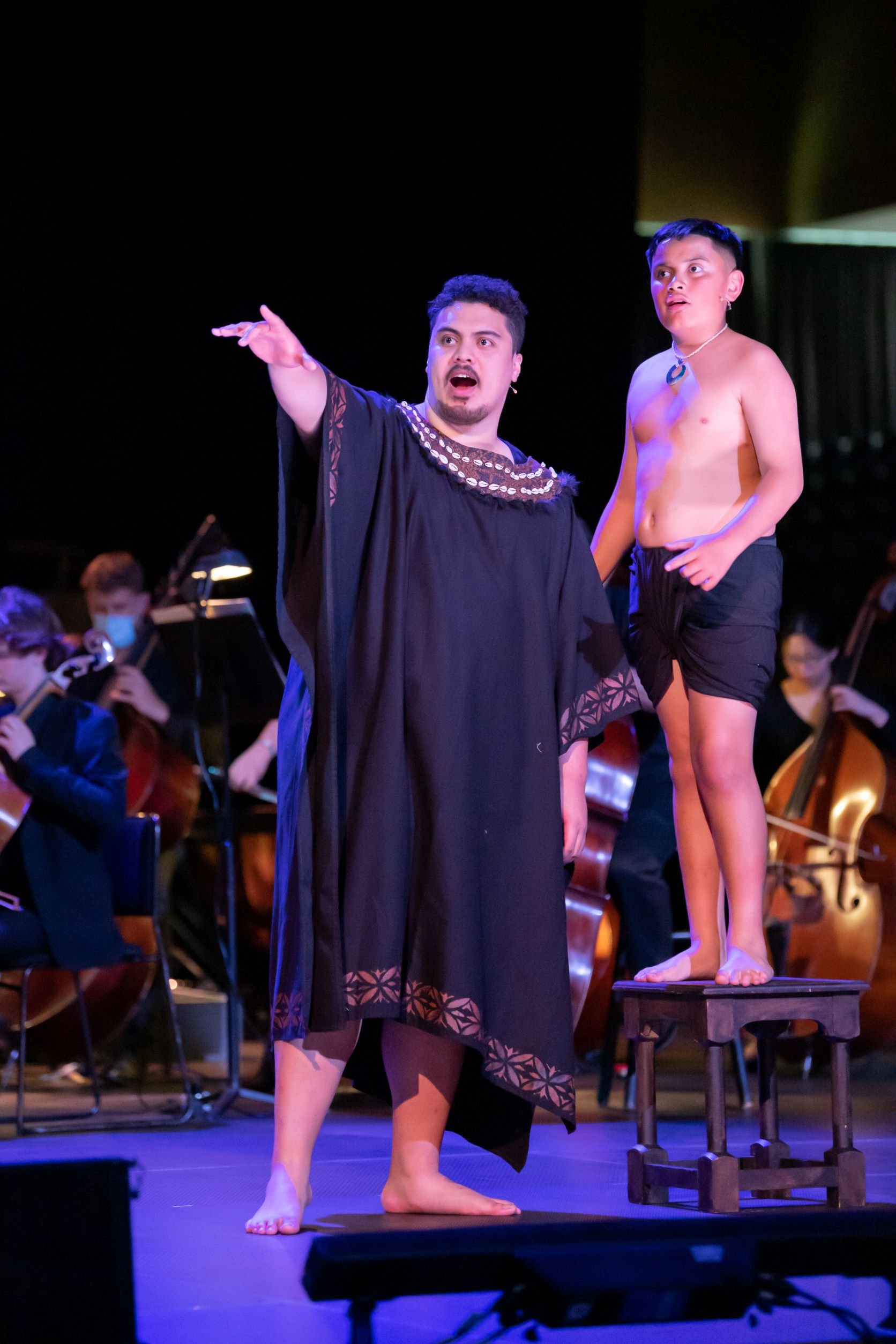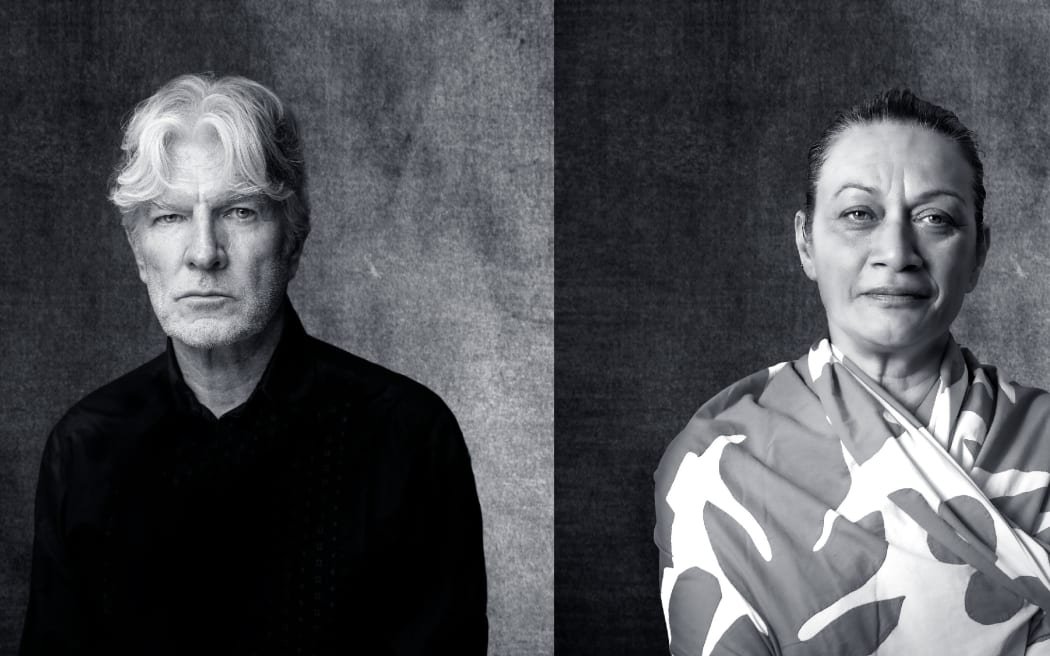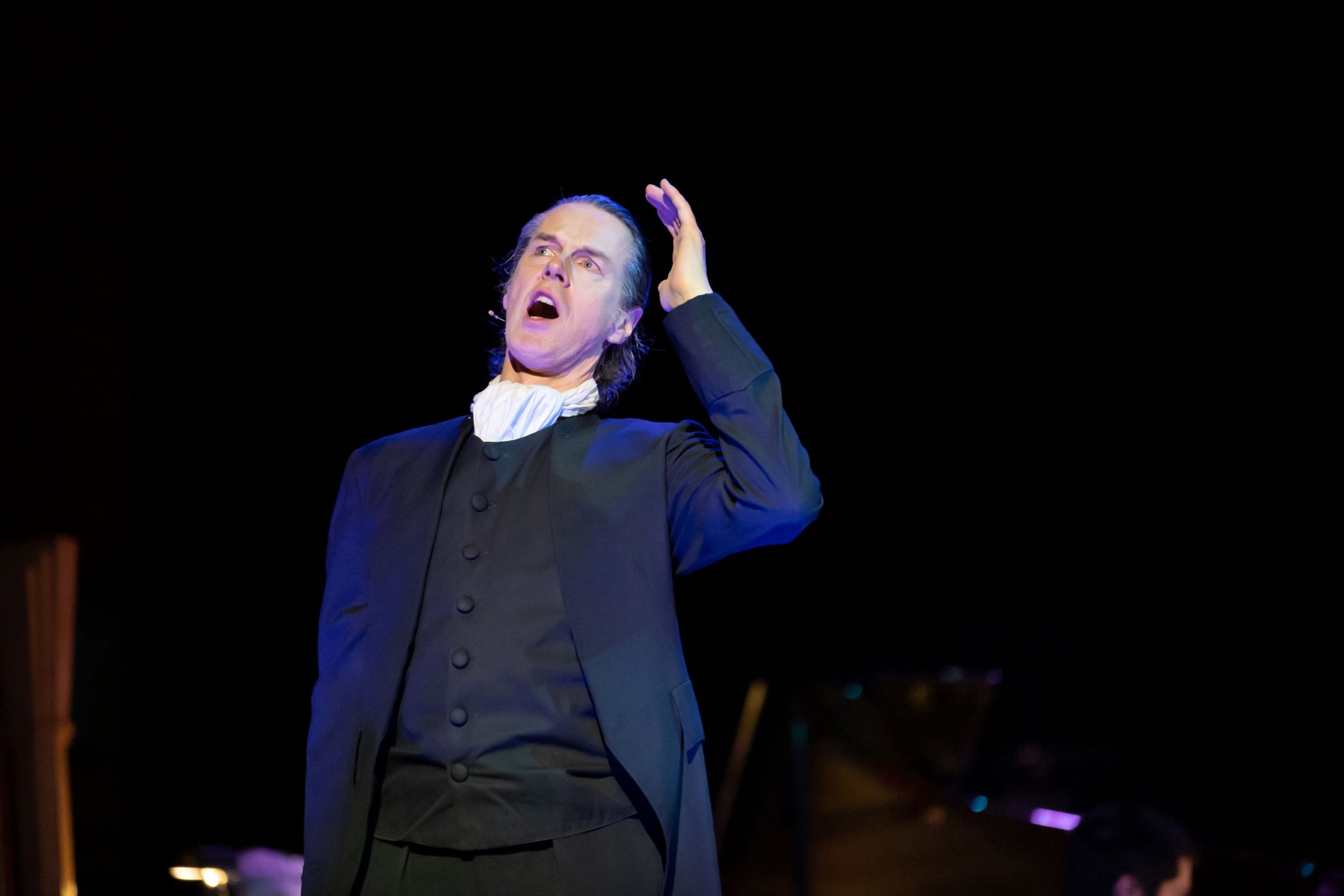NZ Opera’s Ihitai ’Avei’a - Star Navigator: a journey to understanding
Photo credit: Stephen A’Court
Musician Tim Finn and his collaborators embarked on a creative journey when developing Ihitai ’Avei’a - Star Navigator, a work telling the story of an actual journey taken by Tahitian priest and navigator Tupaia[1] on James Cook’s first “voyage of discovery” on the Endeavour between 1768-1771.
The work, premiered in Auckland in March and last week in Porirua, boldly crosses many boundaries, artistic, cultural and stylistic. Ihitai ’Avei’a - Star Navigator is presented by NZ Opera and Orchestra Wellington and sits somewhere between opera, musical and concert. It also explores the borders between colonial and indigenous knowledge, between popular and operatic musical languages and styles and between traditional and contemporary views of what opera is and what it can achieve.
The project began when Finn encountered the story of Tupaia, high-born Polynesian priest and navigator, his young acolyte Teata and the remarkable Tahitian woman Purea. She was noble and formidable, wife of a Tahitian chief, lover of Tupaia and so regal in bearing she was accepted as “Queen of Otaheite” by the crew of the British frigate Dolphin when it visited Tahiti in 1767.
Star navigator Tupaia (Emmanuel Fonoti-Fuimaono) and his acolyte Teata (Risatisone C Malagamaali’i)
Photo credit: Stephen A’Court
When Cook arrived in Tahiti on the Endeavour in 1769, he took Tupaia and the boy Teata on board at the urging of botanist Joseph Banks, but it was some months before the arrogant Captain even partly understood Tupaia’s specialist knowledge of navigation based on the natural world. The Englishman always struggled to accept Polynesian indigenous wisdom and world-view.
When Finn began building the operatic concept some seven years ago, he had been writing songs about these fascinating historical characters but wanted to create a work of larger scale to better tell their dramatic stories. Composer John Psathas recommended talking to Tom McLeod, composer and arranger of music for film, television and stage musical. In a pre-concert talk last week, Finn explained his own approach as “naïve, writing the melody and simple harmonies.” McLeod, he said, then “rips it apart, explodes it harmonically.”
The result of the “Tim and Tom” collaboration has richly-coloured orchestration, with inventive use of percussion and Tahitian instruments including conch shell, vivo (nose-flute) and pate (wooden slit drum). There’s a large choir (in Porirua combining the Orpheus and Signature Choirs with the NZ Opera Chorus) and singing or speaking soloists, with roles for Tupaia, Cook, Purea, Teata and a narrator called The Orator.
Tim Finn, composer of the opera Ihitai ’Avei’a - Star Navigator, and his Tahitian collaborator, Célestine Hitiura Vaite.
The third member of the creative collaboration for Ihitai ’Avei’a - Star Navigator is Tahitian novelist Célestine Hitiura Vaite, who has written a dramatic monologue for Purea and other spoken parts of the production. The performance begins with Vaite on screen, standing in a Tahitian seascape, the ocean roaring behind her as she offers a prayer of welcome in the Tahitian language, explaining her ancestral connection with Purea. “I have walked along your footprints on the sand.”
The opera’s narrative begins as the Endeavour is readied to leave Tahiti, seeking “the great southern continent”. Musically, the work opens with Finn in the middle of the orchestra playing a simple tune at the piano. Then, accompanied by a fierce growl from the orchestra, underlined by timpani, the large choir rises to its feet. Centre stage, the female Orator (Aiolupotea Norah Stevenson-Tuunga) begins the story, the orchestral music telling us through colours and textures that we are on board a ship.
Paul Whelan as Captain James Cook
“… a commanding bass baritone voice.”
Photo credit: Stephen A’Court
Casting is one of the great strengths of this production. As Tupaia, Emmanuel Fonoti-Fuimaono reveals throughout his glowing, rich tenor voice and compelling, dignified stage presence. Experienced opera singer Paul Whelan’s commanding bass baritone voice is marvellous in the role of Cook, a stern, unbending character determined to maintain his status. The important role of Purea, lover and adviser of Tupaia, is sung by Marlena Devoe, a Samoan New Zealand soprano with a growing international reputation. Her voice is lovely, and she balances Purea’s authority and suspicions of Cook with her yearning desire to see Tupaia return safely. Schoolboy Risatisone C Malagamaali’i shows his theatrical skills in the mostly spoken role of Teata.
Soprano Marlena Devoe as Purea
“…balancing authority with yearning desire.”
Photo credit: Stephen A’Court
In a packed talk by the sincere and enthusiastic creative team before the recent opening night in Porirua, Finn spoke of a desire to dispel the “elitism” of opera. Perhaps this led to what seemed eventually to be an over-simpification of the story and the emotional and cultural complexities it embodied.
Ihitai ’Avei’a - Star Navigator is certainly musically simple. Its basis is the pop song, its harmonies tonal and unadventurous and its rhythms and textures perhaps too four-square for the multi-faceted emotional freight the opera is carrying. The cultural misunderstandings are presented through most of the work as simple binaries, facing each other from opposite sides of the stage; the stiff-necked Cook, representing white races and colonial attitudes, is "wrong", while Tupaia, Purea and traditional navigation and knowledge are "right". Is this as simplistic as saying "opera presented as an 'elite' art form is "bad", pop music and its melodic, harmonic and rhythmic simplicity “good”?
Fortunately, towards the end of the 90-minute work the characters, faced with disaster and tragedy, moved closer to some shared understanding and the whole work became more unified. Cook revealed his vulnerabilities, becoming less the arrogant white man, and Tupaia became more urgent and explicit in his desire for Cook to understand him and his traditions. It all ends badly, as opera so often does, but the whole production became more emotionally engaging and more a shared story of our complex history.
For some reason the Aotearoa part of Cook’s voyage is largely absent from the narrative. Historians have explained Tupaia’s importance to Cook’s early encounters with Māori here, but the opera’s story focuses on the journey from Tahiti before and after the Endeavour’s arrival on these shores, the ship and the story heading quickly north across the Tasman. The dangerous reefs off the coast of Australia and the sickness taken on board when the damaged vessel limped to Batavia in the Dutch East Indies lead to the tragic denouement and the genuinely moving portrayal of the deaths of both Teata and Tupaia.
The protagonists Cook and Tupaia supported by massed choral and orchestral forces under the sensitive baton of Uwe Grodd
Photo credit: Stephen A’Court
Under the sensitive baton of Uwe Grodd the orchestral musicians and large choral forces performed splendidly. There were times when the simplicity of the score had a kind of raw power, but this could have been even more effective set against the variety such large and competent musical forces could have delivered. The singers both solo and choral were miked throughout; perhaps the stadium acoustics made this necessary, but amplification inevitably reduces vocal subtlety.
General Director of New Zealand Opera, Thomas de Mallet Burgess, deserves plaudits as he prepares to leave the role after five years. He has stretched the boundaries of opera in this country and willingly explored both a range of operatic repertoire and development of new work. In a message in the programme book, he explains that “New Zealand Opera is also on a journey to understand and better embrace the bi-cultural and cross-cultural richness that is our country. I see this project as a bridge between two cultures and two great navigators in an area where we too often give up because the conversation is too hard.”
The difficult conversations also need a willingness to acknowledge complexity if we are to further bridge those gaps. Opera as an artform has proven over many centuries that it’s capable of great emotional depth and subtlety. Ihitai ’Avei’a - Star Navigator didn’t always find those depths but it successfully opened up artistic and cultural discussions and brought new audiences to the artform. For that it deserved the enthusiastic ovations it received.
Ihitai ’Avei’a - Star Navigator by Tim Finn with Célestine Hitiura Vaite and Tom McLeod, presented by NZ Opera and Orchestra Wellington at the Te Rauparaha Arena, Porirua on December 9 and 11, 2022. Uwe Grodd (Conductor), John Davies (Director).
[1] Tupaia’s story has become better known in Aotearoa in recent times and is told in Joan Druett’s now well-known account, Tupaia: Captain Cook's Polynesian Navigator. Druett also wrote the entry “Tupaia” in Te Ara, the Encyclopedia of New Zealand which is available here.






